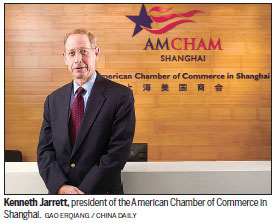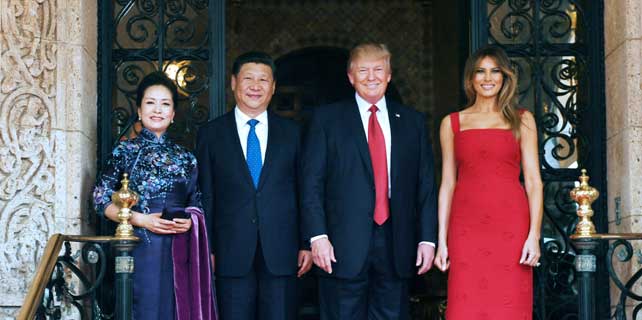Jarrett: Trade war between US and China benefits no one

US businesses in China believe that bilateral trade between Washington and Beijing "creates benefits for all" and that the US government and the American people remain open to Chinese investment, said Kenneth Jarrett, president of the American Chamber of Commerce in Shanghai.
He added that a trade war would be harmful to both countries given the interdependence of the US and Chinese economies.
"No one wants to see a trade warit would be damaging for US workers, US consumers, US companies and US investors, and would also be damaging to China," he said.
While the change of administration has created a sense of uncertainty for companies, Jarrett said the US business community in China will first wait to see how much of US President Donald Trump's campaign rhetoric will become reality before taking action.
Chinese outbound direct investment to the US soared to $45.6 billion last year, according to consultancy Rhodium Group, thrice the amount in 2015. However, growing scrutiny over Chinese investors has led to a growing number of failed buyout attempts, with Washington citing "national security concerns".
"To the extent that Chinese investment creates jobs for Americans, I am confident that it will remain welcome by the US government and the American people," he noted.
The Trump presidency will give priority to economy at the expense of ideological and geopolitical concerns, said Wu Xinbo, director of the Center for American Studies at Fudan University.
"Trump will examine what specific impact China's rise will have on US interests, be it on trade or investment or other issues. On the plus side, he is likely to welcome more Chinese investment in the US, notably in the manufacturing and infrastructure sector," said Wu.
Jarrett said most of the chamber's member companies that have manufacturing operations in China are here to stay because they want to sell to the China market and stay close to their customers rather than export their products back to the US.
"While the rapid increase in Chinese exports do add a certain volatility to the US labor market, the solution to this situation is not protectionism. Rather, the US government should do more to provide training programs and assistance to workers in industries in decline or who have lost their jobs because of technological change or changes in consumer demands," he said.
Jarrett believes the meeting between US President Trump and Chinese President Xi Jinping reflects a mutual awareness of the importance of US-China relations and a desire of the two presidents to establish a productive working relationship.
"The most important result would be for the two presidents to develop a personal rapport so that they can understand each other's priorities and develop a basis for mutual trust," he said.
hewei@chinadaily.com.cn
















